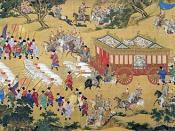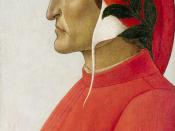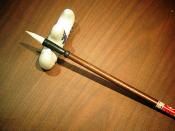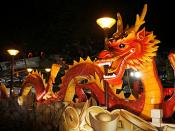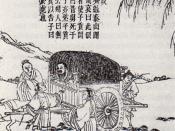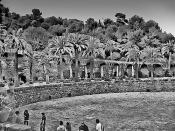After the death of Charlemagne the Normans invented the long boat. These new boats could sail out into the ocean; as was important for the Normans because they were a society based on trade and warriors. The long boat journeys also brought capitalism back to Europe. At this time the Muslims controlled the Italian peninsula, and in 1029 the Normans defeated the Muslim Navy to gain control of the Italy. They also brought capitalism to the Italy and did away with agricultural manors. The manors were inhabited mostly by serfs, and were becoming vastly overpopulated. The manor owners were often cruel to the serfs thinking that it was a God given right to care over them as they saw fit, but when the capitalists took over they opened up the south for the serfs. The new Law of the Free City was put into effect and it said that if a serf could escape their manor and make it to the Free City and live on their own for one year then that serf and all of his descendents were free.
By the time Dante was born Italy had become the largest economic center of the western world, and the advantage of the capitalist economy had given them the opportunity to obtain immeasurable wealth. Once the serfs were not serfs anymore they became a huge benefit to the economy by creating wealth. The serfs also wanted to have a new system of government called republicanism which was already in place in ancient Greece and Rome. The aristocrats opposed this system of government because it gave everyone a voice not just the wealthy and elite class of society. Despite the opposition the new system of government was installed, and they began to make decisions by a majority rules vote. At the time when Dane was getting involved in the political spectrum they were electing 12 Mayors per year. They did this to keep any one Mayor from becoming too strong. Dante was elected Mayor for a three month term which was dissatisfying to him.
After the defeat of the Holy Roams Emperor by the Italians, they were able to freely run their own lives under the republican form of government. With this new governmental freedom also came freedom in education. The common people were then able to have access to books, and science and learning get their first start in Dante's life. Also at this time Civil Wars had broken out in Italy over the poor not being able to sit on a legislature because they did not own land. Between thirty and forty percent of the society still did not have enough money to own land, therefore even if they have money and do not won land they are still not allowed a seat in the legislature.
The Ghibellins were in power before 1250, and had the most money and owned the most land. At the time the most important thing in society was to be an aristocrat; despite their inferior societal class the aristocrats would intermarry with them in order to obtain their wealth and remain aristocrats because the Ghibellins were the richest group at the time. Dante and his family, the Alighieri family, were Ghibellins; and the Ghibellins were opposed by the Guelfs. By the time Dante turned 5 years old the Civil Wars had ended and the Guelfs had won. To show their victory the Guelfs tortured the Ghibellins, tearing down their homes and revoking their citizenship. Yet Dante and his family were not touched by the rampant Guelfs which shows some kind of family prestige. As a Mayor of Florence in the 1300 Dante sees the strengths in both the aristocratic and common traditions.
Dante adopted republicanism when he became Mayor at thirty five years old, and Charlemagne also had to adopt the Roman law. The republican cities were run by legislatures who were more concerned about the law of the aristocrats so they ran things the way they wanted them to be run not necessarily the way the people wanted them to run things. Most of the population wanted to be legally schooled in politics and Italy became a very arguable society. The courts were very busy because everyone thought that they were right and began suing for unjustifiable reasons. Dante's family filed a law suit that extended for 120 years about a church on their front lawn. The church won the suit and is still standing today.
Dante's family had a vineyard and a wine business, and a lot of prestige is associated with being a businessman and owning a business. The boys of the family were sent away at fourteen to be educated in self-reliance and to learn to make it on their own. Women were free to be educated in bookkeeping, language, and writing in order to be able to run the business while the husband was away.
Ancient Roman literature often said that the Bible didn't say enough about learning, but the Bible was only one source leading to the understanding of what it meant to be human. Dante's writing contains psychology explaining how humans make choices in more detail. Thomas Aquines came up with a theory of the human mind called individuation. Aquines was living in a very individualist society unlike that of Charlemagne which was a group oriented society. Aquines' theological principle was that God put and idea into everyone's soul and each individual had to figure it out by their own conscience and morality. This idea grew in Italy, but the Pope was appalled and banded the followers. Yet they were still around and Dante was still a follower of the group.
Ming Dynasty Hung Wu was the first emperor of the Ming Dynasty, and he inherited the political and economic system amidst a foreign occupation by the Mongols. The Chinese have always had a ruling family (dynasties), but the family often becomes large and one part of the family is dominant in ruling the land. This happened to Charlemagne in the west with the Canolingion Dynasty. The government based on democratic republicanism surfaced in China with the traders and based on economics and the pursuit of building a greater state.
The dynasty on record is the Shang dynasty which was in power from 1500-1000 B.C. and was between the Yellow River and the Yangtze River, and it only had a small piece of China which would not change for the next 100 years. Second the Zhou (1000-770 B.C.) and Eastern Zhou (770-221B.C.) dynasties. Confucius lived during the rule of the Eastern Zhou, and during his life was when a large part of the great ideas of the world were formed. Confucianism fully established that extended family in a hierarchy was the idea of politics before communism. The primary model for a government was a household; the head of the household has a job to do and must be very intelligent in order to take care of the family. The Chinese wanted intelligent people in the high positions so they were the first to create civil service based on a merit system.
The religious culture in China differed from all others in that they do not believe that God created things with his own hands. They believe that you learn from how the world works, what you see with your own senses, and science is their greatest knowledge. I Ching is the Chinese equivalence to the Bible and it means book of changes. I Ching is a basic book to explain the Chinese universe. During the Han dynasty (215 B.C. - 220 A.D.) the Chinese began to look at and determine what they thought was responsible for many natural events. They looked into how nature works, the changing of the seasons, forming groups, and the sixty four changes that they thought the world went through. Anyone who wanted to be in the government was required to take an examination on I Ching in order to qualify for the job. They believed that with more knowledge you can become closer to nature and what you are expected to be. The Chin dynasty (221A.D. - 215 A.D.) put the whole country together by instituting legalism which meant that the whole country had to abide by the laws set by the emperor. He melded all the states together into one, and began the construction of the Great Wall of China.
China was and still is a very agriculturally based economy. Businessmen were seen as a lower social class in society. The business was restricted to near the Yangtze River, and to the trade route built by the Han called the Great Silk Road. The Chinese were just the middlemen in the trade though, and only had the products to trade back and forth with other western countries they were not dealing with the death and the growth of the market. Just before the Ming Dynasty took over the Mongols would periodically invade China.
The cultural of China was very good by this time, and they had translated the I Ching into the Mongol language. The norms of China began to change with heavy taxes on the farmers. During the time just before Hung Wu takes over China a change in values was seen because of all the people coming in from different parts of the world. Hung Wu is coming in on a land that is not free, people who have lost many of their traditions, and he is going to have to be a revolutionary to remedy China and its people.
Hung Wu took over China in 1368 only to lead a revolution against the current way of life. In the dynasty the leader makes decisions that are unchallenged and he is advised by his ministers, but in the Mongol clan the structure of government is not so structured. There is more freedom and the leader is more likely to be challenged. The Chinese were exposed to this culture because the Mongols liked business and were using the Great Silk Road which promoted business people in China. Hung Wu did not like for the business people to be promoted because that was moving towards a society where only the landowners were respected. He tried to set up an equalized economy where he handed out the land evenly, especially to landless farmers like his own father.
Before Hung Wu the Han dynasty did something very similar. The Han dynasty created places called quality inns for people to stay, at government cost, while looking for work; also grain and horses were often lent out to the poor if they were needed. The Tang dynasty was in power before the Mongols took over, and they gave each family 13.1 acres of land which could be passed down through the family provided that no laws were broken. If your family broke a law then your land could be taken away. The 13th emperor of the Ming Dynasty was Wan Li. He became emperor at age nine he had Chang Chu Cheng and Shen Shih Hsing as his ministers. He ruled with a traditional idea of lateral authority and governed more at the local levels.
China now remains a primarily agricultural nation, but business has been rising and affecting the publics view on business and business people. Hung Wu had no respect for business and he even passes a law that farmers could not sell their land to pawnbrokers because he thought a farmer should own his own land. Yet during the time of Wan Li's rule there were more that 20,000 pawn shops. Wan Li was interested in furthering business along the Yangtze River which is still one of the largest business areas in china today. China again became a wealthy civilized state and the money was not being drained from the economy. The growing wealth in China began to attract Mongols again and the Emperor sends troops to the capital to enforce his policies. He has a hard time changing public policy and with his troops. He also has a family crisis because he does not want his first child to become the next Emperor. He causes controversy throughout the family, and he then becomes distant from the business aspect of his country and begins to focus on his death and where he will be buried which eventually leads to the fall of the Ming dynasty.
